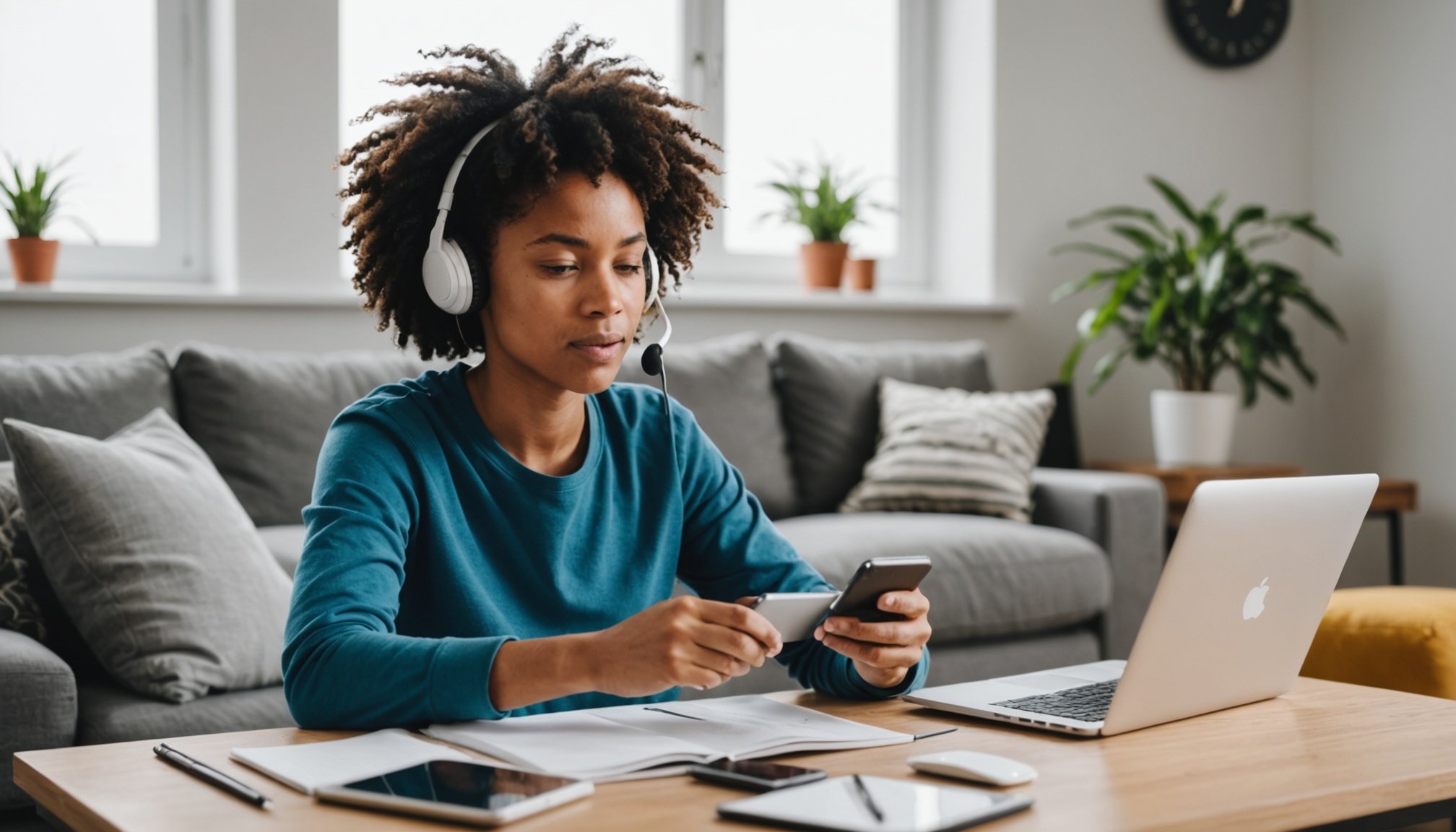Unlock Effective Techniques to Reduce Screen Time and Boost Your Mental Health
In today’s digital age, it’s easy to get sucked into the vortex of screens, from smartphones and computers to TVs and tablets. While technology has many benefits, excessive screen time can have significant negative impacts on your mental and physical health. Here’s a comprehensive guide to help you reduce your screen time and improve your overall well-being.
Understanding the Risks of Excessive Screen Time
Before we dive into the solutions, it’s crucial to understand the risks associated with spending too much time in front of screens.
Topic to read : Unveiling the benefits of eco-friendly workspaces on employee mental health and well-being
Health Impacts
Excessive screen time is linked to a range of health issues, including:
- Eye Strain and Vision Problems: Prolonged screen use can lead to eye fatigue, dry eyes, and even long-term vision problems[3].
- Sleep Quality: Exposure to blue light from screens can disrupt your sleep patterns, leading to poor sleep quality and related mental health issues[1].
- Mental Health: Excessive screen time is associated with increased stress, anxiety, and depression. It can also lead to social isolation and decreased physical activity[1][4].
- Cognitive Decline: A study published in the Journal of the American Geriatrics Society suggests that spending more than 6 hours a day on the internet may increase the risk of developing dementia[2].
Social and Behavioral Impacts
- Social Media Addiction: Constantly checking social media can lead to feelings of inadequacy, low self-esteem, and a distorted view of reality[1][4].
- Work-Life Balance: Excessive screen time can blur the lines between work and personal life, leading to burnout and decreased productivity[3].
Recognizing the Problem
The first step to reducing screen time is acknowledging that you have a problem. Here are some signs that you might be spending too much time in front of screens:
Have you seen this : Revolutionizing chronic skin care: the role of telemedicine in transforming treatment approaches
Signs of Excessive Screen Use
- Fatigue and Irritability: If you feel tired, irritable, or have trouble concentrating, it could be a sign of excessive screen use[1].
- Sleep Disturbances: Trouble sleeping or waking up feeling unrefreshed could be linked to your screen time habits[1].
- Guilt and Time Management Issues: Feeling guilty about the amount of time spent on screens or struggling to find time for other activities are red flags[1].
Practical Strategies to Reduce Screen Time
Reducing screen time is not about eliminating screens entirely but about finding a healthy balance. Here are some practical strategies to help you achieve this balance.
Take Control of Your Notifications
One of the simplest yet most effective ways to reduce screen time is to manage your notifications. Here’s how:
- Disable Non-Essential Notifications: Turn off notifications for apps that are not critical. Keep only the essential ones, such as calls and important messages[1].
- Use Do Not Disturb Mode: Activate the “Do Not Disturb” mode during certain hours of the day or night to minimize distractions.
Implement a Digital Detox
A digital detox can be a powerful way to reset your relationship with screens.
What is a Digital Detox?
A digital detox involves taking a break from digital devices for a specified period. This can range from a few hours to several days.
Benefits of a Digital Detox
- Improved Sleep Quality: Avoiding screens before bedtime can significantly improve your sleep quality[1].
- Increased Productivity: Taking breaks from digital devices can help you focus better on your tasks and improve overall productivity[1].
- Enhanced Mental Clarity: A digital detox can help reduce stress and improve mental clarity by giving you time to reflect and engage in other activities[1].
Create Screen-Free Zones and Times
Designating screen-free zones and times can help you establish healthier habits.
Screen-Free Zones
- Dining Table: Make the dining table a screen-free zone to encourage family interaction and healthier eating habits[1].
- Bedroom: Keep your bedroom screen-free to improve sleep quality and create a relaxing environment[1].
Screen-Free Times
- Morning Routine: Start your day without screens. Instead, engage in activities like meditation, reading, or exercise[1].
- Evening Routine: Avoid screens at least an hour before bedtime. Opt for activities like reading, journaling, or spending time with family[1].
Using Technology to Your Advantage
While technology can be a part of the problem, it can also be part of the solution.
Apps to Help Reduce Screen Time
There are several apps designed to help you track and reduce your screen time.
Examples of Apps
- Screen Time (iOS): This built-in app tracks your screen time and provides detailed reports on your usage. It also allows you to set time limits for specific apps and categories[1].
- Digital Wellbeing (Android): Similar to Screen Time, this app tracks your screen time and offers features like Wind Down mode to help you prepare for bed[1].
- Freedom: This app blocks distracting apps and websites across all your devices to help you stay focused[1].
Organizing Your Workspace for Better Health
For those who work on computers, organizing your workspace is crucial to reducing the health risks associated with screen time.
Ergonomic Workspace
- Adjust Your Chair and Desk: Ensure your chair and desk are at comfortable heights to avoid straining your back and neck[3].
- Take Breaks: Take regular breaks to stand up, stretch, and move around. This can help reduce the risk of musculoskeletal disorders and other health issues[3].
Table: Risks and Prevention Measures for Screen Use at Work
| Risks | Prevention Measures |
|---|---|
| Eye Strain | Adjust the brightness and contrast of your screen. Follow the 20-20-20 rule: every 20 minutes, look away from your screen and focus on something 20 feet away for 20 seconds[3]. |
| Musculoskeletal Disorders | Ensure your workspace is ergonomically set up. Take regular breaks to stretch and move around[3]. |
| Stress and Mental Fatigue | Organize your work to include regular breaks. Use stress-reducing techniques like deep breathing or meditation[3]. |
| Postural Problems | Alternate between sitting and standing. Use a standing desk if possible[3]. |
Engaging in Alternative Activities
Replacing screen time with other activities can be a great way to reduce your overall screen time.
Physical Activities
- Exercise: Engage in physical activities like walking, jogging, or any sport you enjoy. This can help improve your physical health and reduce screen time[1].
- Outdoor Activities: Spend time outdoors by gardening, hiking, or simply taking a walk in the park[1].
Creative and Social Activities
- Hobbies: Engage in hobbies like painting, reading, or playing a musical instrument. These activities can help you relax and express yourself creatively[1].
- Social Interactions: Spend more time with family and friends. Engage in activities that promote social interaction, such as joining a club or volunteering[1].
Reducing screen time is a journey that requires awareness, commitment, and the right strategies. Here are some final tips to help you on your way:
Be Conscious of Your Use
- Track Your Time: Use apps or built-in features to track your screen time. This will help you understand where you can cut back[1].
- Set Goals: Set realistic goals for reducing your screen time. Start with small changes and gradually work your way up[1].
Seek Help When Needed
- Professional Help: If you find it difficult to manage your screen time on your own, consider seeking help from a mental health professional[4].
- Support Groups: Join support groups or online communities where people share their experiences and tips for reducing screen time[4].
By implementing these strategies, you can significantly reduce your screen time and improve your mental health. Remember, it’s about finding a balance that works for you and enhancing your overall quality of life.
Final Thoughts
As Dr. Jean Twenge, a renowned psychologist, notes, “The key is to use technology in a way that complements our lives, rather than controlling them.” By taking control of your screen time, you’re not just improving your health; you’re also reclaiming your time and enhancing your well-being.
So, take the first step today. Start by recognizing the problem, then use the strategies outlined here to reduce your screen time. Your mental health will thank you.








